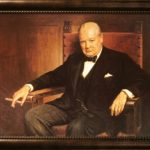Leopold was born in 1835 and was King of the Belgians from 1865 – 1909. We are told that he was lively and energetic practically from birth, and that he was unusually ambitious. Looking around him at countries like near neighbour France, distant Austro-Hungary, just-over-the-sea Britain, he saw empires. He wanted Belgium to have immense overseas territories too. She had some, of course, but in Leopold’s opinion not enough.
In 1876 at the age of forty-one he was President of the African International Association, which organised expeditions to Central Africa. Here was a vast area, he thought, in need of some Belgian influence. It is said he used the Association as a cover for his own plans.
Leopold had heard of the adventures of H.M. Stanley, who had crossed the African continent, followed the River Congo from the heart of Africa to the Atlantic coast. In 1879 the King employed Stanley. In the following five years he established land and water communications from the Congo estuary to Stanley Falls, a distance of one thousand miles.
This could have been a magnificent start for the King’s colonial ambitions but he was stopped by his own Parliament, which disrespectfully disagreed with the Monarch’s territorial desire for African colonies. This did not hinder Leopold, who reckoned he would form a personal empire with the support of the great powers Britain, France and Germany. A good talker, Leopold persuaded representatives of the three that it would be preferable to make the Congo a ‘free trade area’ under his ‘international’ regime (remember the African International Association), rather than let its riches fall into the hands of a rival, for instance, Russia or Scandinavia.
The Berlin Conference (1884) established the Congo Free State (with Leopold as its chief), and recognised it as a ‘Sovereign (literally) State. This means that a very large part of Equatorial Africa had now become the private estate of a European king. It was all arranged cleverly, but Leopold himself never actually visited the Congo! All he wanted was to make money out of it, as all owners of private estates do. He encouraged his officials to demand goods such as rubber and ivory from the headmen of each village. Pity those chiefs who did not comply. They were officially mutilated, flogged or had their hands and feet cut off. Sometimes they were simply eliminated.
Inevitably, this reign of terror was reported in the international press and there was a huge outcry.
Leopold was represented as a cruel dictator, and the Belgian Government was forced to take control out of his hands – something they were loth to do, had never wanted anyway. Shortly afterwards Leopold II died in 1909. He was seventy-four.












Leave A Comment